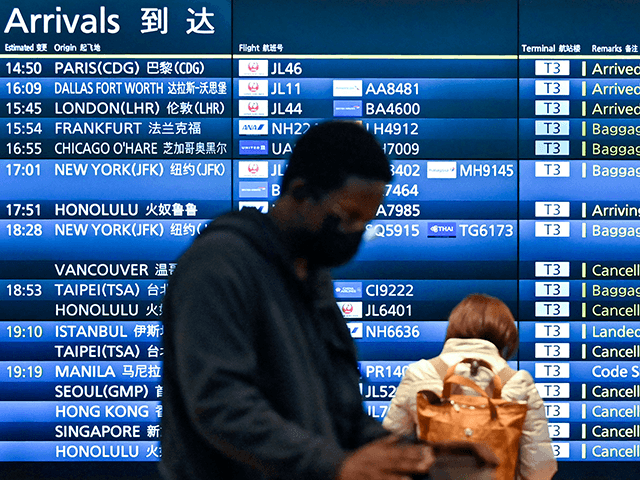Japan’s government announced Wednesday it will extend an existing travel ban on all foreign entries to include foreigners with resident status or long-term visas in Japan.
The new restriction goes into effect on December 2 and will deny re-entry to Japan for “all foreigners, including residents with long-term visas, who have recently been to Angola, Botswana, Eswatini, Lesotho, Malawi, Mozambique, Namibia, South Africa, Zambia and Zimbabwe,” Kyodo News reported.
Japan’s Ministry of Land, Infrastructure, Transport, and Tourism on December 1 asked Nippon Airways Co. and Japan Airlines Co. to “stop taking reservations for inbound international flights” until at least the end of December.
“From the view of prevention, we won’t just restrict new entry by foreigners but also returning foreigners with resident status, unless there are special extenuating circumstances,” Japan’s Chief Cabinet Secretary, Matsuno Hirokazu, told reporters at a press conference on December 1.
Matsuno said the travel ban for foreign residents of Japan will remain in place “for the time being.”
“We will maintain a sense of urgency and keep track of the situation in various countries to be able to respond quickly and flexibly,” he added.
UPDATE: #Japan asks airlines not to accept inbound flight reservations over #Omicron#japantravelbanhttps://t.co/ZbEq3ve1s2
— Kyodo News | Japan (@kyodo_english) December 1, 2021
Tokyo on Tuesday imposed a travel ban on all foreign entries to Japan for at least one month in response to news that Omicron — a new variant of “Covid-19,” also known as the Chinese coronavirus — had emerged in recent days in Southern Africa.
The World Health Organization (W.H.O.) designated Omicron a “variant of concern” on November 26, saying it demonstrates “several mutations that may have an impact on how it behaves, for example, on how easily it spreads or the severity of illness it causes.” It remains unclear if Omicron is more contagious or causes more severe illness than existing variants of “Covid-19,” which is the disease caused by the coronavirus known as SARS-CoV-2. Preliminary anecdotal evidence out of South Africa suggests Omicron causes mild illness in patients.
“The [Omicron] patients that has been vaccinated so far have no complication [sic],” Angelique Coetzee, the national chair of the South African Medical Association, told CNN’s “New Day” program on November 30.
“I have seen vaccinated people and not really very sick. That might change going forward, as we say, this is early days. And this is maybe what makes us hopeful,” she added.
Japan recorded its first Omicron case on November 30 in a man who arrived in Tokyo from Namibia on November 28. Matsuno described the patient as “a diplomat from Namibia in his thirties who arrived at the Japanese capital’s airport of Narita.”
The man presented “no symptoms” of illness upon arriving at Tokyo-Narita on Sunday “but developed a fever on Monday,” according to Japan’s health ministry. Japanese Health Minister Goto Shigeyuki told reporters on November 30 the Namibian diplomat was “fully vaccinated” though he did not specify with which vaccine.
Japan confirmed its second Omicron infection on December 1 in “a man in his 20s who arrived at Narita airport near Tokyo on Saturday [November 27] after recently staying in Peru,” Matsuno told reporters.
“The man, who is fully vaccinated with Pfizer Inc.’s COVID-19 vaccine, was initially asymptomatic but later developed a fever and sore throat,” according to Japan’s Chief Cabinet Secretary.

COMMENTS
Please let us know if you're having issues with commenting.